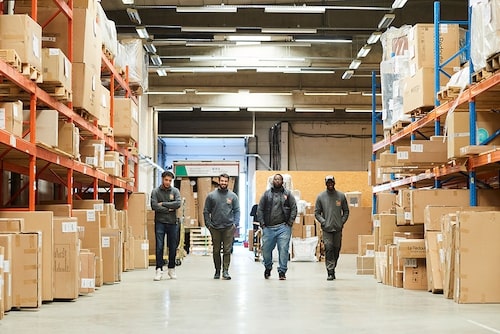Belgium’s New Delivery Law: What Online Retailers Must Know in 2025

What Is the 2024 Belgian Last Mile Delivery Law?
As logistics continues to evolve in response to consumer demand and regulatory pressure, Belgium has taken a firm step toward more responsible and efficient delivery operations. In 2024, the country amended its economic legislation to place explicit responsibility on online sellers to improve their last-mile delivery practices.
This legal update is not just about compliance—it reflects broader shifts in urban planning, sustainability goals, and customer experience. For logistics professionals and e-commerce executives, understanding the scope and operational consequences of this law is crucial. It affects not only checkout experiences but also fleet composition, carrier relationships, and emissions reporting.
In Q3 2024, Belgium amended its Code of Economic Law to require all e-commerce businesses selling to Belgian customers to:
-
Offer at least two delivery methods at checkout
-
Ensure one of those options is sustainable (e.g. lockers, pickup points, bike couriers, or EVs)
Source: Belgium FPS Economy – Circular Q4 2024
Who Must Comply?
Knowing whether your business must comply with Belgium’s updated last-mile law is the first step in building a compliant and competitive logistics operation. While the regulation casts a wide net across domestic and international retailers, it does make room for exceptions based on business maturity and delivery model.
Even if your company qualifies for a temporary exemption, there are strong commercial reasons to align early with the law’s intent. Customers increasingly prefer and reward sustainable practices, and marketplaces are likely to enforce standards platform-wide.
This applies to:
-
All e-commerce retailers operating in or targeting Belgium
-
Both domestic and cross-border sellers
Exemptions:
-
Businesses under 3 years old
-
Stores offering only in-store pickup
Why This Law Was Introduced
Belgium’s last-mile regulation is not arbitrary. It was introduced after years of pressure from multiple stakeholders—city governments seeking to reduce pollution, citizens frustrated by traffic, and customers demanding faster, greener options.
Understanding the “why” behind the law helps logistics and e-commerce executives align their operations not only for compliance, but also for long-term strategic benefit. If you’re planning infrastructure, setting delivery policies, or evaluating sustainability investments, the context behind this regulation matters.
1. Urban Congestion and Emissions
-
Last-mile delivery accounts for ~30% of urban traffic and 25% of emissions in Belgian cities like Brussels and Antwerp.
-
The law supports national and EU climate targets for mobility.
2. Consumer Pressure for Green Delivery
-
60% of Belgians prefer brands with eco-friendly delivery options.
-
25% avoid businesses that don’t offer them.
-
34% are willing to pay more for sustainable shipping.
Sources: VIL Vlaanderen Logistics Report, GLS Belgium 2024, bpost Insights 2025
What Counts as a Sustainable Delivery Option?
Compliance isn’t just a checkbox—it requires operational adjustments and possibly new partnerships. Many retailers are unsure what counts as a “sustainable delivery option” under Belgium’s law. Is a hybrid van enough? Do lockers qualify? What about pickup in local shops?
The law recognises these as acceptable:
-
Parcel lockers (bpost, PostNL)
-
Pickup points (retailers, lockers)
-
Cargo bikes and bicycle couriers (Urbike, Cargo Velo)
-
Electric vehicle delivery (e.g. Trunkrs, bpost EVs)
-
Urban micro-hubs with zero-emission final legs
Retailers can use 3PLs, but they are responsible for ensuring those options are available and verifiable.
Penalties for Non-Compliance
Failing to comply with Belgium’s delivery law isn’t just a reputational risk—it carries substantial financial consequences. If your company does not offer a sustainable delivery method, you may face regulatory penalties and be flagged by major platforms and marketplaces.
-
Fines up to €10,000 per offence
-
Penalties up to 4% of total turnover
-
Potential restrictions on trading platforms or ad networks
Repeat violations may result in heightened regulatory scrutiny or removal from local platforms.
What Retailers & Logistics Execs Should Do Now
With legal enforcement active and consumer expectations rising, logistics and retail teams need to act decisively. Whether you rely on 3PLs or run in-house fulfilment, these steps will help futureproof your checkout flow, partner selection, and sustainability metrics. These are not only defensive moves to avoid fines but also strategic investments in conversion, trust, and long-term viability.
-
Update your checkout process to show 2+ delivery options
-
Flag one option as low-emission or sustainable
-
Ensure 3PL partners are compliant
-
Retain proof (checkout screenshots, contracts, courier credentials)
-
Track delivery emissions where possible
-
Communicate delivery options clearly in customer journeys
Opportunities for Logistics Providers and 3PLs
While some see regulation as a hurdle, smart logistics providers see opportunity. Belgium’s new law creates demand for emission-reducing delivery tech, smarter route management, and scalable last-mile infrastructure.
If you’re in urban freight, courier services, locker solutions, or fulfilment software, this is your time to grow. Retailers need plug-and-play compliance. The market needs tools that can scale.
This law opens new B2B opportunities for:
-
Urban EV fleets
-
Cargo bike courier services
-
Smart parcel locker networks
-
White-label fulfilment services with compliant SLAs
-
Emissions tracking tools (route optimisation, ESG dashboards)
Example: Ingrid Delivery reports 27.7% higher conversion rates for merchants offering 3–5 delivery options at checkout.
FAQs: Belgium’s Last Mile Regulation
What is the 2024 logistics law in Belgium?
It mandates 2+ delivery options at checkout, one of which must be sustainable.
Who enforces this law?
The Federal Public Service Economy (FPS Economy).
Do marketplace sellers need to comply?
Yes. Sellers on platforms like Amazon or Bol.com are still subject to this law.
Is using bike couriers required?
No. But it’s one of the easiest ways to offer compliant delivery.
Are startups exempt?
Yes—for up to 3 years, unless they exceed a set turnover threshold.
How do I prove compliance?
Maintain delivery policies, 3PL contracts, emissions data, and checkout screen logs.
Internal Resources:
-
Eco-Friendly Last Mile Delivery Options (/sustainable-last-mile/)
-
How to Offer Same-Day Delivery in Belgium (/same-day-delivery-belgium/)
-
Smart Last Mile Strategies for Retailers (/last-mile-strategies-for-retailers/)
Written by: Logistics & Compliance Editorial Team, Record Express